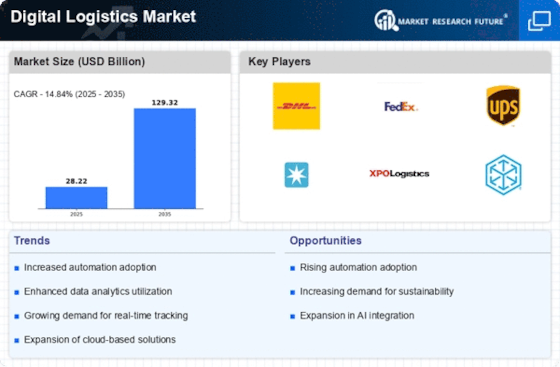Top Industry Leaders in the Digital Logistics Market

Digitizing the Road Ahead: Exploration of the Digital Logistics Market
The global logistics landscape is undergoing a paradigm shift, embracing the transformative power of digital technologies. This burgeoning Digital Logistics Market, projected to reach a staggering growth by 2027, is attracting a diverse array of players vying for dominance in an increasingly digitized ecosystem.
Key Players:
- IBM Corporation
- Bosch Inc.
- Infosys
- Tech Mahindra
- Oracle Corporation
- HCL Technologies
- International Business Machines Corporation
- Huawei Technologies Co. Ltd.
- Hexaware Technologies
- Samsung Group
- JDA Software Group Inc.
- Advantech Co.
Factors for Market Share Analysis:
-
Product Portfolio Breadth: Offering a comprehensive suite of solutions across transportation, warehousing, visibility, and data analytics is crucial. Players with broad portfolios cater to diverse customer needs and gain an edge.
-
Technological Innovation: Adopting cutting-edge technologies like AI for optimized routing, blockchain for secure data sharing, and IoT for real-time tracking differentiates leaders. Continuous innovation and integration of advanced tools are key to staying ahead.
-
Network Reach and Scalability: Global presence and seamless connectivity with carriers, warehouses, and logistics partners are essential for market penetration. Players with robust networks offer customers wider options and ensure efficient operations.
-
Customization and User Experience: Providing customizable solutions tailored to specific industry needs and offering user-friendly interfaces for easy adoption are critical. Players who prioritize user experience foster loyalty and long-term partnerships.
-
Sustainability Focus: The rise of eco-conscious consumers and regulations is pushing the market towards solutions that optimize resource utilization, reduce emissions, and promote green logistics practices. Players who demonstrate a commitment to sustainability gain competitive advantage.
Emerging Companies and Trends:
-
Hyperlocal Delivery Startups: Companies like Glovo and DoorDash focus on on-demand, last-mile delivery in urban areas, catering to e-commerce and restaurant needs with rapid deployment and innovative delivery models. Their agility and hyperlocal focus address changing consumer demands.
-
Autonomous Vehicle and Drone Adoption: Companies like Tesla and Amazon are pioneering the use of autonomous vehicles and drones for long-haul and last-mile deliveries, promising increased efficiency, reduced costs, and faster delivery times. These emerging technologies hold immense potential for future market evolution.
-
Predictive Analytics and Smart Contracts: Advanced analytics platforms utilizing AI and machine learning enable predictive maintenance of vehicles, route optimization, and demand forecasting, optimizing resource allocation and improving service reliability. Blockchain-based smart contracts automate payments and documentation, ensuring transparency and streamlining logistics processes.
Current Company Investment Trends:
-
Venture Capital (VC) Funding: VC firms are actively pouring billions into promising digital logistics startups, recognizing the vast potential of this rapidly growing market. Investments focus on AI-powered solutions, automation technologies, and sustainable logistics practices.
-
Strategic Partnerships and Acquisitions: Established players are acquiring smaller companies with specialized expertise in niche areas or cutting-edge technologies to extend their service offerings and gain access to new customer segments. Collaborations and joint ventures are accelerating innovation and market consolidation.
-
Internal R&D Investments: Major players are allocating significant resources to internal research and development initiatives, focusing on in-house development of proprietary technologies and platforms to maintain their competitive edge and differentiate themselves in the market.
The Road Ahead:
The Digital Logistics Market is characterized by intense competition, dynamic technological advancements, and evolving customer expectations. Players must demonstrate agility, adapt to changing demands, and prioritize continuous innovation to secure their position in this transformative landscape. Embracing open collaboration, partnering with startups and technology leaders, and prioritizing customer-centric solutions will be critical for success in this highly competitive and rapidly evolving market. As the world grapples with supply chain disruptions and increasing demand for efficient and sustainable logistics solutions, those who navigate the digital transformation effectively will pave the way for a seamless and efficient future of logistics.
Latest Company Updates:
- December 2023: Uber Freight acquires Transplace for USD 2.25 billion, expanding its digital freight brokerage services.
- November 2023: Maersk partners with IBM to develop a blockchain-based platform for secure and transparent supply chain management.
- January 2024: Autonomous trucks successfully complete long-haul deliveries in pilot projects.










